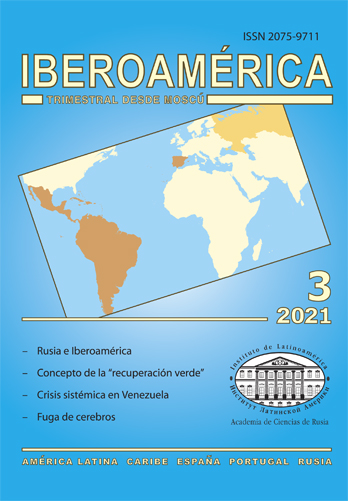
The issue begins by a section of articles devoted to comparative analysis as for the nowadays development of Russia, Spain and Latin America. The first one, written by Jose Maria Cordero Aparicio, is called “Revised Model Of Relationships Between Macroeconomic Variables, Applied to Russia And Spain”. That`s a renewed and completed version of the report presented at the Russian-Spanish Symposium which took place in Moscow in 2011. On that occasion the author spoke about a model of mathematical connections between macroeconomic variables. The present article contains an improved and simpler version of the equation. Correlation between inflation and other macroeconomic indices has been the starting point towards the model`s framing in both investigations.
The second article, by Gavrilova V. E., takes up the digitalization in the financial area and its instrumental basis – the monetary system. The author is sure that the digital change in Latin America`s and Russia`s monetary systems has its own preconditions and specific character. That phenomenon has its origin in the level and quality life and economic growth and depends on the degree of the country`s involvement in digitalization processes. Such changes might tell on the role, tasks and responsibility undertaken by national governments in their efforts to ensure the financial system`s steadiness.
The third article, by Yakovlev P. P., tackles the matter of relations between Russia and Latin America under hard conditions imposed by COVID-19. The author underscores that at the end of the first and beginning of the second decades of our century the relations between Russia and some Latin American countries could be called strategic partnership. Its core consists of cooperation without staunch ally ties and stinting mutual pledges, which lets the partners join efforts in order to solve domestic and international problems of really importance. The coronavirus pandemic which got hold of Russia and Latin America in 2020, highlights the stark need to deepen the Russian-Latin American cooperation in the field of scientific and technical development and co-production of vaccines in necessary quantities.
The last work of the section deals with the contribution made by Russian immigrants to scientific development in Paraguay. The authors, Marta I. Canese de Estigarribia, Valentina Canese Caballero, Silvia Elisa Estigarribia Canese, wrote about the activities of some Russian scientists who had immigrated to Paraguay, drawing attention to the great contribution they had made in the fields of Engineering, Exact and Human Sciences in that country. Although this contribution was called in question later, the authors deem it laid the foundations for the scientific and research culture in Paraguay.
The following section comprises only two articles and is about the environmental threat in Latin America. The first one, by Kjeifets V. L. and Pravdiuk D. A., offers a review of the conceptual foundations of the “green renewal” policy, one of the utmost post-pandemic strategies in Latin American counties, and the key fields in which that policy is being put into practice. The authors inquire into the reasons for working out long-term plans to get over the dire outcomes of the coronavirus pandemic according to the steady development principals. They analyse the main documents that international organizations have issued on the topic.
The article “Latin America In The Fight Against Environmental Threats”, by Naumenko T. V. and Kozyreva M. S., depicts ecological problems of the region, which imply a threat of global character. That makes it necessary to work out a plan to solve them. The authors put into analysis the chief economic methods for improving the environmental management system in Latin America, for example, including the environmental methods in the agreements on preferential trade and promoting the circulation of environmentally preferred goods.
The first article of the following section is about the systemic crisis and military-civilian relations in Venezuela. The author, Iwanowski Z. W., proves that in the modern Venezuela the mission of the armed forces is far beyond the tasks of national defense security. In his opinion, the military institution has got grasp of civilian powers. He draws the attention to the fact that the opposition couldn`t manage support of the power structures. The chief reasons of the crisis (which temporarily lapsed into a latent stage) remain. Such a situation makes that a joint quest for solutions, set up on a compromise between supporters and opponents of the “socialism of the XXI century”, should be undertaken.
The next article called “Latin Americans In US Universities”, by Kodzoev M. A-M. and Krekova M. M., tackles the topic in three key areas: business, personnel and policy. The research reveals that a negative effect comes to being at the other end of the educational immigration as the result of the highly skilled personnel`s large-scale departure. That`s why the problem of “brain drain” in some Latin American countries, worsen by economic and political difficulties, has been taken up.
The last article belongs to Alexis Moncada (Chile), who investigates the problem of discrimination which affects Colombian immigrants in the mining regions of northern Chile. The author analyses the causes of the migratory movement, shows the facts of racism and xenophobia, depicts the women`s situation. He underscores that an adequate migration policy should be worked out in order to include the migrants into the country`s society.
IBEROAMERICA, 2021, num.3 (July – Sentember)
Content
RUSSIA - IBEROAMERICA: A COMPARATIVE ANALYSIS
LATIN AMERICA AND ENVIRONMENTAL THREATS
Tamara V. Naumenko, Maria S. Kozyreva. Latin America in the fight against environmental threats
POLITICS, “BRAIN LEAK” AND HUMAN RIGHTS
Zbignev V. Iwanowski. Venezuela: systemic crisis and civil-military relations
Magomed A-M. Kodzoev, Marina M. Krekova. Latin Americans in US universities
Alexis Mondaca. Discrimination against colombian immigrants in the northern regions of Chile














